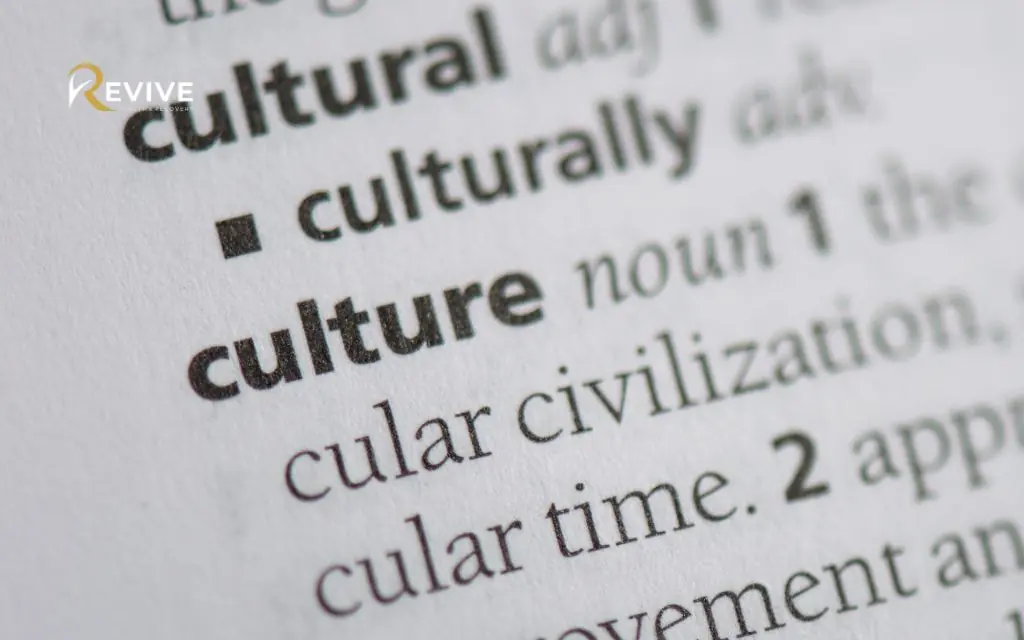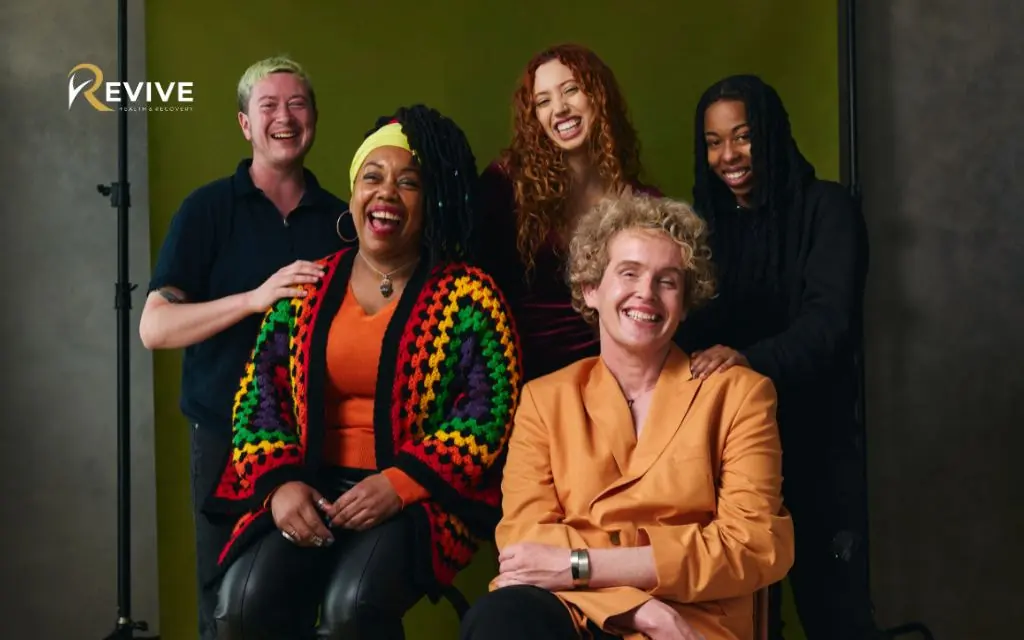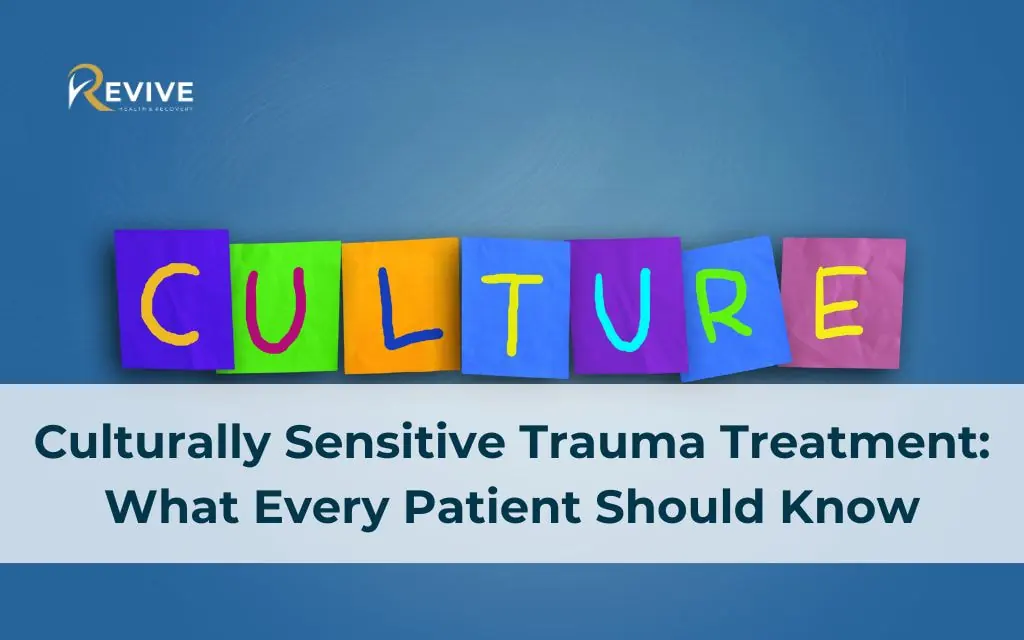When talking about Trauma Recovery Insights, Trauma affects individuals across all walks of life, yet our cultural identities fundamentally shape how we experience, process, and heal from traumatic events. Culturally sensitive trauma treatment recognizes that effective healing must honor the unique cultural contexts that influence how people understand their experiences and seek recovery.
At Revive Health Recovery in Denver, Colorado, we understand that trauma treatment cannot follow a one-size-fits-all approach. Cultural values, beliefs, and practices significantly impact how individuals express distress, interpret symptoms, and engage with mental health services. Our center embraces this knowledge, making culturally competent care a cornerstone of our therapeutic approach.
When therapists understand and respect a client’s cultural background, they create a foundation of trust that supports the entire recovery process.
Getting to Know Culturally Sensitive Trauma Treatment
What Does It Mean to Provide Culturally Competent Care?
Culturally competent trauma treatment integrates an understanding of cultural backgrounds, values, and identities into every aspect of the therapeutic process. This approach recognizes that culture fundamentally shapes how people experience trauma, express symptoms, and navigate recovery.
For instance, in some cultures, mental health challenges carry significant stigma, making individuals reluctant to seek help. Other cultures may emphasize collective healing through family or community involvement rather than individual therapy. Understanding these differences allows therapists to develop treatment plans that respect cultural norms while addressing trauma effectively.

Cultural considerations in psychotherapy extend beyond ethnicity to include religious practices, generational perspectives, socioeconomic backgrounds, and many other factors. Dr. Frederick T. L. Leong, a pioneer in cross-cultural psychology, emphasizes that culturally sensitive therapists must develop awareness of their own cultural biases while building knowledge about diverse cultures and acquiring skills to work effectively across cultural differences.
The Importance of Culturally Sensitive Trauma Treatment
Cultural sensitivity in trauma treatment reduces barriers that prevent diverse populations from accessing mental health care. When therapists demonstrate genuine understanding and respect for cultural perspectives, clients feel validated and understood—critical factors in trauma recovery.
Research consistently shows that racial, ethnic, and linguistic disparities exist in mental health care access and quality. Culturally sensitive trauma treatment directly addresses these disparities by creating therapeutic environments where everyone feels welcome and understood.
Intersectionality plays a crucial role in trauma therapy. A person’s gender, race, religion, sexual orientation, and socioeconomic status interact to create unique trauma experiences, particularly for women who may require specialized care at women’s trauma treatment centers. For example, a Muslim woman from a refugee background may experience trauma differently than a native-born American man, requiring therapists to consider multiple aspects of identity in treatment planning.
The American Psychological Association’s guidelines on cultural competence emphasize that effective trauma treatment must consider these intersectional factors rather than treating cultural identity as a single, isolated variable.
Trauma Treatment for Diverse Populations
Evidence-Based Approaches with Cultural Adaptations
Modern trauma treatment includes various evidence-based approaches that can be adapted to respect cultural diversity, with holistic trauma treatment approaches offering comprehensive care that integrates mind, body, and spirit. Some evidence-based approaches, such as Cognitive Behavioral Therapy (CBT), Eye Movement Desensitization and Reprocessing (EMDR), and Somatic Therapy all demonstrate effectiveness across cultures when therapists make appropriate modifications.
For example, standard CBT exercises might be adjusted to incorporate cultural values regarding family hierarchy or religious beliefs. EMDR protocols can integrate culturally relevant imagery and metaphors that resonate with clients’ worldviews.
Some treatment approaches incorporate traditional healing methods from different cultures alongside Western therapeutic techniques, while other specialized programs like trauma recovery programs for first responders address the unique needs of professionals exposed to high-stress environments. This integration honors cultural wisdom while providing comprehensive care. Practices like mindfulness meditation (originally from Buddhist traditions), smudging ceremonies (from Indigenous cultures), or faith-based healing, as explored in spiritual practices in trauma healing, can complement conventional therapy approaches when relevant to a client’s background.
Addressing Unique Mental Health Challenges in Different Communities
Immigrant and refugee populations often face distinctive trauma challenges, including displacement trauma, acculturation stress, and experiences of discrimination, while survivors of domestic violence may require specialized trauma therapy for domestic violence survivors to address their unique experiences. Culturally sensitive trauma treatment for these groups must address these specific stressors while recognizing strengths such as resilience and community support.
Language barriers present significant obstacles to effective trauma treatment. At Revive Health Recovery, we prioritize providing services in clients’ preferred languages whenever possible, either through bilingual therapists or qualified interpreters trained in mental health terminology.

Cultural stigma regarding mental health varies widely across communities. Some cultures view mental health challenges as character weaknesses, spiritual problems, or family matters not to be discussed with outsiders. Culturally competent therapists acknowledge these perspectives without judgment while gently providing education about trauma’s physiological and psychological impacts.
What to Expect in a Culturally Sensitive Trauma Treatment
Culturally sensitive trauma treatment recognizes that trauma experiences and healing pathways vary across cultural contexts. This approach integrates cultural identity as a core component of trauma recovery rather than applying one-size-fits-all Western models to diverse populations.
In culturally responsive therapy, expect:
- Initial cultural assessment that explores your cultural identity, values, and beliefs
- Recognition of how cultural factors influence trauma expression and healing
- Integration of traditional healing practices alongside evidence-based approaches
- Acknowledgment of historical and collective trauma affecting cultural groups
- Linguistic accessibility including options for native language therapy when needed
- Respect for culturally-specific expression of distress beyond diagnostic categories
For marginalized communities, culturally sensitive treatment addresses how societal factors such as discrimination and racism compound trauma effects. This approach also recognizes that some trauma categories affect specific cultural groups disproportionately, requiring specialized knowledge from therapists.
At Revive Health Recovery, our providers deliver trauma therapy with cultural humility – acknowledging each client’s cultural expertise about their own experience while providing clinical expertise within a culturally informed framework. This collaborative approach honors diverse pathways to healing while maintaining therapeutic effectiveness.
How to Find Culturally Sensitive Trauma Treatment in Denver
How to Ensure a Therapist is Culturally Competent
When seeking culturally sensitive trauma treatment, consider asking potential therapists these questions:
- What training have you received in cultural competence?
- How do you incorporate cultural considerations into your treatment approach?
- Have you worked with clients from my cultural background before?
- How do you handle situations where you’re unfamiliar with a cultural practice or belief?
Key indicators of culturally competent providers include:
- Ongoing cultural competence training and education
- Diverse staff representing various cultural backgrounds
- Multilingual services or reliable interpreter access
- Flexible approaches that incorporate cultural practices when appropriate
- Community connections with cultural organizations
To find culturally sensitive trauma therapists in Denver, contact Revive Health Recovery directly for a consultation about your specific needs.
American Psychological Association’s Guidelines on Cultural Competence
The American Psychological Association (APA) plays a fundamental role in establishing standards for cultural competence in psychology. Their guidelines emphasize that cultural competence requires ongoing development rather than representing a fixed achievement.

The APA’s cultural guidelines have transformed modern trauma therapy by establishing that culturally responsive care is essential rather than optional. These guidelines direct therapists to:
- Recognize cultural factors in all aspects of psychological practice
- Acknowledge the importance of self-awareness regarding personal biases
- Understand the complex way culture influences psychological processes
- Consider socio-political contexts that affect mental health
- Respect cultural values while maintaining ethical standards
Therapists who follow these guidelines demonstrate commitment to providing equitable, respectful care to all clients regardless of background.
Cost & Accessibility of Culturally Sensitive Trauma Treatment
The cost of culturally sensitive trauma treatment in Denver varies widely, typically ranging from $100-200 per session for private practice therapists. However, numerous options exist to make treatment more accessible:
- Many insurance plans now cover culturally competent mental health services
- Community mental health centers often offer sliding scale fees based on income
- Group therapy options may provide more affordable alternatives
- Some organizations offer specialized programs for underserved communities
- Telehealth options can reduce barriers related to transportation and childcare
At Revive Health Recovery Denver, we believe financial constraints should never prevent access to culturally sensitive care. We work with various insurance providers and offer flexible payment options to ensure all community members can receive appropriate trauma treatment.
Reviews of culturally sensitive trauma treatment in Denver providers consistently show that cultural competence significantly improves treatment outcomes. Clients report higher satisfaction, better therapeutic relationships, and more sustainable recovery when they receive culturally appropriate care. As one client at Revive Health Recovery shared: “For the first time, I didn’t have to explain my cultural background before talking about my trauma. My therapist already understood the context, which allowed me to focus on healing.”
Frequently Asked Questions (FAQs)
How do I know if my trauma therapist is culturally competent?
Look for therapists who ask about your cultural background, listen without judgment, acknowledge the importance of your cultural identity, and adapt their approach to respect your values. Cultural competence shows in actions, not just credentials.
Why is cultural sensitivity important in trauma treatment?
Cultural sensitivity ensures that trauma treatment respects your identity, honors your values, and addresses your specific needs. Without it, therapy may miss crucial aspects of your experience or impose approaches that conflict with your cultural framework.
Does Revive Health Recovery offer bilingual therapy services?
Yes, Revive Health Recovery offers therapy services in multiple languages. When bilingual therapists aren’t available for specific languages, we arrange qualified interpreters trained in mental health terminology.
How can traditional healing practices be incorporated into therapy?
Therapists can integrate traditional practices by learning about their significance, collaborating with traditional healers when appropriate, and creating space for these practices within treatment plans. This might include incorporating prayer, meditation, cultural rituals, or community healing approaches.
What are the best resources for culturally competent mental health care in Denver?
Denver offers numerous resources including the Colorado Cross-Cultural Health Network, Asian Pacific Development Center, Denver Indian Health and Family Services, and the Center for African American Health. Revive Health Recovery maintains partnerships with these and other cultural organizations.
Are culturally sensitive trauma therapy programs covered by insurance?
Many insurance plans now cover culturally sensitive trauma treatment. Check with your provider about specific coverage details. Revive Health Recovery works with numerous insurance companies and can help verify your benefits.
Why Choose Revive Health Recovery for Culturally Sensitive Trauma Treatment?
Revive Health Recovery stands at the forefront of culturally sensitive trauma treatment in Denver. Our approach recognizes the fundamental role culture plays in both traumatic experiences and healing processes. We combine evidence-based trauma therapies with deep respect for cultural diversity.
Our team includes therapists from diverse cultural backgrounds, many with specialized training in specific cultural contexts. We regularly consult with cultural experts like Dr. Beverly Greene, whose groundbreaking work on intersectionality in trauma therapy informs our practice.
We maintain active partnerships with cultural organizations throughout Denver, ensuring we stay connected to community needs and resources. This community integration allows us to provide truly comprehensive care that extends beyond our clinic walls.
Conclusion
Culturally sensitive trauma treatment represents the gold standard in mental health care. By honoring the unique cultural contexts that shape our experiences, this approach creates pathways to healing that respect individual identity while providing effective trauma resolution.
At Revive Health Recovery, we remain committed to providing trauma treatment that meets the highest standards of cultural competence. We understand that trauma healing happens within cultural contexts, not separate from them.
If you or someone you know needs Trauma Care Options that honors cultural identity, reach out to Revive Health Recovery today. Our team stands ready to provide compassionate, culturally sensitive care tailored to your unique needs and background.
To learn more about our culturally sensitive trauma treatment programs or to schedule a consultation, contact Revive Health Recovery at (303) 268-4655 or visit our center at 1427 S Federal Blvd, Denver, CO 80219.



